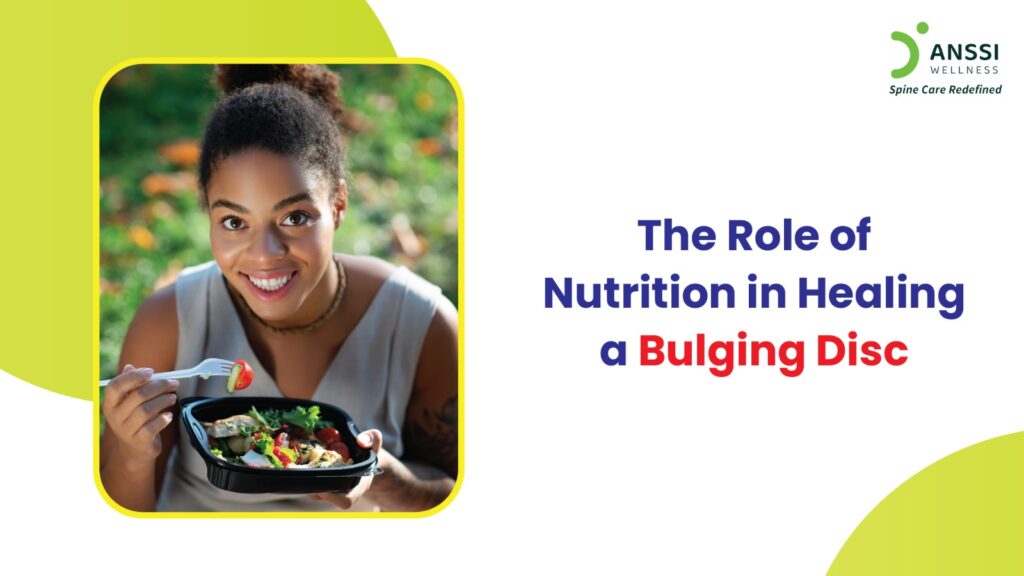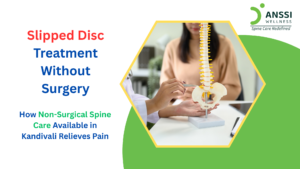A bulging disc, also known as a disc protrusion, is a common spinal condition where the soft inner material of a spinal disc pushes out through a weakened portion of its outer shell. This often leads to nerve compression, causing back pain, neck pain, or radiating symptoms like numbness and tingling.
While non-surgical treatments such as spinal decompression, physiotherapy, and posture correction play a central role in managing this condition, one often overlooked yet powerful contributor to healing is nutrition. What you eat can either support or delay the recovery process.
How Nutrition Affects Disc Health
Your spinal discs are composed mostly of water, collagen, and proteoglycans. These substances require a constant supply of nutrients to maintain structural integrity and hydration.
Discs don’t receive a direct blood supply, so they rely on diffusion from nearby capillaries to get the nutrients they need. This means that a nutrient-rich, anti-inflammatory diet is vital for keeping your discs healthy and promoting healing.
If your diet lacks essential vitamins and minerals, your body may struggle to repair damaged tissues, control inflammation, or maintain disc hydration. This is especially critical during recovery from a bulging disc, where supporting the body’s natural healing processes is essential.
Key Nutrients That Support Disc Recovery
A well-balanced diet with specific nutrients can help reduce inflammation, strengthen connective tissues, and ease discomfort. Here are some of the most beneficial nutrients for people recovering from a bulging disc:
1. Omega-3 Fatty Acids
Omega-3s have potent anti-inflammatory properties that can help reduce swelling around nerves and joints.
They’re found in foods like:
- Fatty fish (Bangda, Rawas, Rohu)
- Walnuts
- Alsi and sabja seeds
Including omega-3s regularly in your diet can help minimise chronic inflammation, improving overall recovery outcomes.
2. Vitamin D and Calcium
Strong bones are essential for supporting your spine. Vitamin D helps your body absorb calcium, which is critical for bone density and spinal strength.
Good sources include:
- Fortified dairy products
- Leafy greens (for calcium)
- Sunlight exposure (for vitamin D)
- Eggs and fatty fish
People with low vitamin D levels often experience more pain and slower recovery, so it’s worth getting your levels checked if you’re healing from a disc issue.
3. Magnesium
Magnesium plays a key role in muscle relaxation, nerve function, and reducing muscle spasms. Many people with chronic back pain are unknowingly magnesium-deficient.
Add these foods to your diet:
- Palak
- Almonds
- Dark chocolate (in moderation)
- Avocados
Magnesium also supports the nervous system, which is important when a disc is compressing nearby nerves.
4. Vitamin C
Vitamin C is essential for collagen synthesis, which is the main structural protein in connective tissues, including spinal discs. It also has antioxidant properties that support immune health and reduce tissue damage.
Include:
- Citrus fruits (oranges, lemons)
- Shimla mirch
- Broccoli
- Strawberries
Regular intake helps regenerate the outer disc layer and keeps ligaments and tendons strong.
5. Protein
Protein provides the building blocks for tissue repair. Whether it’s from lean meat, eggs, dairy, or plant-based sources like lentils and tofu, protein is essential for maintaining muscle strength and healing damaged spinal tissues.
Hydration and the Anti-Inflammatory Diet
Hydration is often underestimated in spinal care. Since spinal discs are about 80% water, staying well-hydrated helps keep them flexible, cushion-like, and functional. Aim to drink at least 8 glasses of water a day, and more if you’re physically active.
In addition, adopting an anti-inflammatory diet can significantly reduce pain and support healing.
This means reducing:
- Processed foods
- Refined sugars
- Fried or fatty foods
And increasing:
- Fruits and vegetables (especially berries, leafy greens, and cruciferous vegetables)
- Whole grains like oats and brown rice
- Herbs like turmeric and ginger
These changes can improve your overall health and accelerate recovery from spinal issues.
Tips for Incorporating Nutrition into Your Recovery
Here are some practical strategies to improve your diet while undergoing non-surgical treatment for a bulging disc:
- Plan Balanced Meals: Include lean protein, healthy fats, and complex carbohydrates in every meal.
- Snack Smart: Choose nuts, fruits, or yoghurt over chips and sweets.
- Avoid Inflammatory Foods: Cut down on red meat, white bread, sugar, and soda.
- Cook at Home: Preparing meals at home allows better control over ingredients and portion sizes.
- Consult a Dietitian: A qualified nutritionist can personalise your food plan based on your medical history, activity level, and ongoing treatment.
The Role of Non-Surgical Treatments with Good Nutrition
While nutrition is essential, it works best when combined with non-surgical spinal treatments. Approaches like:
- Non-Surgical Spinal Decompression Treatment: Reduces pressure on the bulging disc and nerves
- Physiotherapy: Strengthens core muscles, improves posture, and prevents future injuries
- Posture Correction and Ergonomic Support: Helps align the spine properly during sitting, standing, and sleeping
When paired with the right nutrients, these treatments become even more effective, offering long-lasting relief and improved spinal function without surgery, injections, or strong medications.
About ANSSI:
ANSSI Wellness focuses on improving the quality of life for patients suffering from spinal issues, aiming to provide relief where other conventional treatments have failed. Through advanced non-surgical spinal decompression treatment, ANSSI is committed to helping patients avoid surgery and recover in a safe, effective, and compassionate environment.
Connect with ANSSI Wellness on LinkedIn, Instagram, and Facebook for expert guidance.




